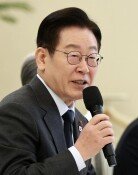Exploiting Family Reunions for Money
Exploiting Family Reunions for Money
Posted September. 13, 2010 11:41,
North Korea`s Red Cross proposed Friday a fresh round of inter-Korean family reunions around the Chuseok (Full Moon Harvest) holidays (Sept. 21-23), expressing hope for the revival of bilateral humanitarian cooperation. It is physically difficult for the reunions to be held over the holidays, however, because more than a month is needed to discuss the timing and the number of families before making the final list. Last year`s reunions took place between Sept. 26 and Oct. 1, a month after the two sides had agreed on it Aug. 28. The North knows that reunions over Chuseok are almost impossible. Had it considered the pain that separated families go through, it would never have made the hasty proposal.
Pyongyang`s true intent behind its proposal made just 12 days before Chuseok is obvious. On Sept. 4, the North asked the South to send rice, cement and construction equipment to help the communist country recover from floods. Three days later, it released a South Korean fishing boat and its crew after a month of captivity. Pyongyang`s comment on "humanitarian cooperation projects" hints at seeking Seoul`s provision of large-scale assistance. The North has been exploiting the family reunions to receive aid, having asked for rice aid during last year`s Chuseok reunions.
If the North wants to discuss humanitarianism, it must first apologize for its torpedo attack on the South Korean naval vessel Cheonan March 26. Pyongyang earlier declared the "demise" of the six-party nuclear talks, only to propose another round of the dialogue after Seoul announced the results of an international joint investigation into the Cheonan sinking. The North, however, cannot simply get away with the attack this time through its old trick of proposing dialogue after committing a provocation.
Inter-Korean family reunions should be held in any form. With more than 3,000 applicants dying of old age every year, however, occasional reunions are not a solution to this humanitarian issue. Of 128,000 South Korean applicants for reunions with their relatives in the North, some 44,000 people have died since 1988. North Korea demonstrated its benevolence by allowing just 100 people to reunite with their separated families last year. Under this approach, it would take more than 80 years to reunite all separated families even if the two Koreas arranged reunions for 1,000 people every year.
The solution is holding reunions regularly to dramatically increase the number of families reunited. Seoul should strive for regular reunions. It should also demand that Pyongyang repatriate Korean War POWs and South Koreans abducted to the North rather than just allow them to meet their families in the South again. Seoul should abandon its practice of holding high-profile events such as an inter-Korean summit every time the North makes a reconciliatory gesture when Pyongyang rejects concessions on such humanitarian issues.







